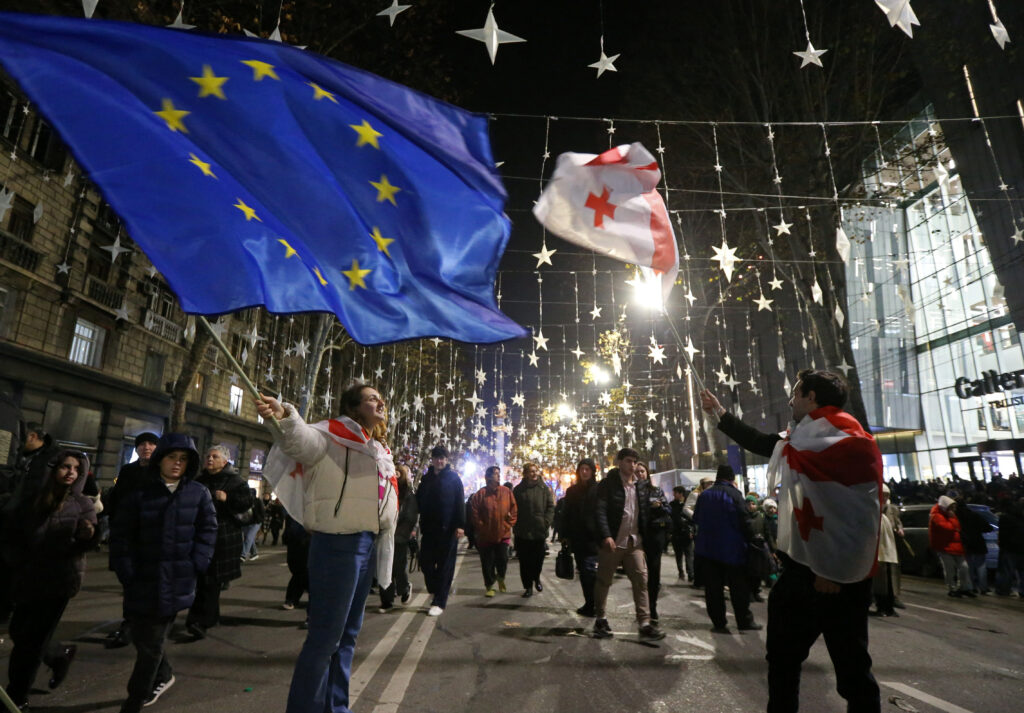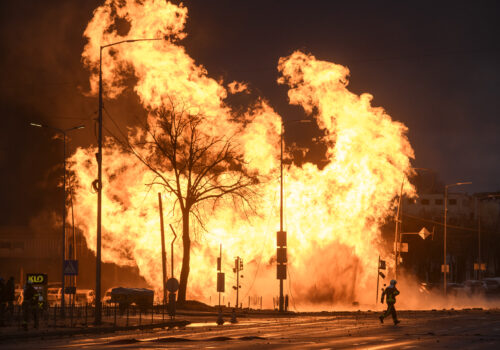On December 14, 2023, the European Union made history by designating Georgia as an official candidate country. On the same day, the European Council also confirmed its decision to start accession discussions with Ukraine and Moldova. European Council President Charles Michel heralded this as “a clear signal of hope for our continent.” Joseph Borrell, the EU’s Chief Diplomat, praised the move as an “historic step toward a stronger European Family.”
This breakthrough in Brussels added to the festive Christmas atmosphere in Tbilisi, with celebratory billboards soon greeting Georgians with the message, “Happy Candidate Status!” With Georgia scheduled to hold parliamentary elections in the final months of 2024, this recent progress on the path toward European integration is likely to play an important part in shaping the broader political mood in the country during the year ahead.
Stay updated
As the world watches the Russian invasion of Ukraine unfold, UkraineAlert delivers the best Atlantic Council expert insight and analysis on Ukraine twice a week directly to your inbox.
More than two decades after the landmark Rose Revolution, Georgia finds itself at a geopolitical junction. The period since 2003 has not only shaped Georgia’s foreign and domestic policies, but has also highlighted the country’s longstanding ties to European civilization. Despite centuries of efforts by the Russian Empire and the Soviet Union to dilute this European identity, Georgia’s commitment to a European future has proven durable.
The significance of the EU’s recent decision to grant Georgia official candidate country status cannot be overstated, especially in light of the present Georgian government’s ambiguous stance toward the full-scale Russian invasion of Ukraine. The authorities in Tbilisi have declined to join Western sanctions, choosing instead to maintain open borders with the Russian Federation and resume direct flights with Moscow. Since the start of the full-scale invasion, hundreds of thousands of Russians have flocked to Georgia.
Georgian attitudes toward Russia’s war in Ukraine reflect more than three decades of war and turmoil, including the 2008 Russian invasion of the country and ongoing Russian occupation of Georgia’s Abkhazia and Tskhinvali regions. The Georgian authorities have been accused of exploiting these social sensitivities to avoid adopting a firm stance in opposition to the attack on Ukraine. Some government officials have even accused the West of seeking to drag Georgia into the escalating confrontation with Moscow. Meanwhile, in spring 2023, Georgian Prime Minister Irakli Garibashvili made international headlines by blaming NATO for the invasion of Ukraine in comments that directly echoed Kremlin propaganda.
Eurasia Center events

The current geopolitical tensions in Georgia only serve to amplify the importance of the EU’s recent decision regarding candidate country status. Crucially, this move solidifies Georgia’s European identity while frustrating the Kremlin’s efforts to promote an alternative vision of Georgia as part of a Moscow-led Eurasian space.
It also represents a significant milestone in the European Union’s enlargement into the Black Sea region, a process that raises the prospect of a free, united, and peaceful Europe. This post-Cold War ideal has arguably never been more relevant than in the current security environment amid the continent’s largest invasion since World War II.
EU candidate status is particularly welcome as it goes some way to addressing the widespread frustration felt in Tbilisi at the lack of progress over the past fifteen years following NATO’s 2008 commitment to future Ukrainian and Georgian membership of the alliance. While the prospect of progress toward EU membership cannot replace the security guarantees provided by NATO, it does represent an opportunity to anchor the country more firmly within the Western community of nations.
Georgia’s geopolitical trajectory will be a key issue as the country prepares to vote in parliamentary elections toward the end of the current year. Since taking power in 2012, the present Georgian authorities have been accused of reversing pro-democracy reforms and seeking to monopolize power while cracking down on the country’s opposition and civil society. EU candidacy will now test Georgia’s readiness to embrace issues such as judicial reform and anti-corruption measures, while also meeting EU expectations on human rights, media freedoms, electoral reform, and more.
According to the National Democratic Institute, nearly 80% of Georgians have consistently favored EU membership for over a decade. This enduring support, despite Moscow’s attempts to manipulate public opinion, suggests a deep-rooted commitment to European values and institutions throughout Georgian society. Looking ahead, 2024 is shaping up to be a crucial year for Georgia’s European aspirations. This could have implications for the wider region, while also creating fresh challenges for Russia’s own imperial ambitions in Georgia and beyond.
Zviad Adzinbaia is a Ph.D. Fellow in International Security at The Fletcher School of Law and Diplomacy and co-founder of LEADx Change, an International Leadership Accelerator and Public Square Summit based in Tbilisi.
Further reading
The views expressed in UkraineAlert are solely those of the authors and do not necessarily reflect the views of the Atlantic Council, its staff, or its supporters.

The Eurasia Center’s mission is to enhance transatlantic cooperation in promoting stability, democratic values, and prosperity in Eurasia, from Eastern Europe and Turkey in the West to the Caucasus, Russia, and Central Asia in the East.
Follow us on social media
and support our work
Image: People attend a rally to celebrate the European Council's decision to grant Georgia European Union candidate status, in Tbilisi, Georgia December 15, 2023. (REUTERS/Irakli Gedenidze)




